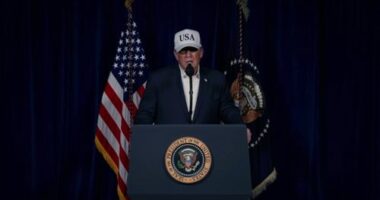Share this @internewscast.com
Yet, exactly five years after Floyd’s murder, the nation has seen a drastic reversal of support for racial equity efforts. Commitments made by corporate America and the government have been dialled back or eliminated. Diversity, equity and inclusion policies and programs are in the cross-hairs of President Donald Trump’s administration. Some of these rollbacks predate his Oval Office return.
Experts say periods of backlash aren’t new. Throughout American history, including after the civil rights movement, the nation has experienced periods of “racial fatigue” or resentment after progress was made toward securing rights for marginalised groups.
“There’s been growing scepticism in the last five years,” said Juliana Horowitz, co-author of the report and Pew Research’s senior associate director of research. “It’s a very sizeable shift.”
The racial equity debate in corporate America
“We can hold the private sector accountable because they cannot afford the withdrawal of our dollars,” said Sharpton, the founder of National Action Network, who has met with a number of company CEOs urging them to reverse their DEI rollbacks or maintain their policies.

Five years after George Floyd’s death, the protesters are gone and an iconic monument outside the White House has been erased, leaving many to wonder if the movement blew its chance for historic change by failing to win over the American public. Source: AFP / Kerem Yucel
Civil rights advocates have called for corporations to increase minority leadership representation and invest in under-served communities.
While civil rights advocates say DEI ensures qualified minority candidates have equal opportunities, McGary and other critics have characterised the efforts as not being merit-based, “everybody should be pushed to have an excellent standard,” he said.
Black Lives Matter movement ‘at a crossroads’
“This progress, which was material, but not the progress we would have wanted, is now threatened even further,” Morial said. “We need mayors, city council members, state legislatures and local governmental officials to pick up the mantle of police reform.”










